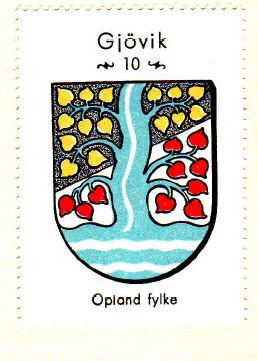Gjøvik: Difference between revisions
Jump to navigation
Jump to search
Knorrepoes (talk | contribs) m (Text replace - "'''Origin/meaning :'''<br/> The" to "====Origin/meaning==== The") |
Knorrepoes (talk | contribs) No edit summary |
||
| Line 10: | Line 10: | ||
[[File:gjovik.gif|center]] | [[File:gjovik.gif|center]] | ||
====Official blazon==== | |||
På blå bunn en svømmende sølv svane. | |||
====Origin/meaning==== | ====Origin/meaning==== | ||
| Line 17: | Line 20: | ||
The old arms were devised and adopted in 1922. The division of the shield symbolises the dark forests around the (light) city. The pale symbolises the the Hunnselva river that runs into the lake Mjøsa (the largest lake in Norway). At the same time the pale is a linden tree without a known meaning. | The old arms were devised and adopted in 1922. The division of the shield symbolises the dark forests around the (light) city. The pale symbolises the the Hunnselva river that runs into the lake Mjøsa (the largest lake in Norway). At the same time the pale is a linden tree without a known meaning. | ||
{|align="center" | {|align="center" | ||
Revision as of 09:53, 29 March 2013
| Heraldry of the World Civic heraldry of Norway - Norske Kommunevåpen |
GJØVIK
Province : Oppland
Official blazon
På blå bunn en svømmende sølv svane.
Origin/meaning
The arms were officially granted on September 2, 1960.
The new arms symbolise the nickname of the town, the white swan at the lake Mjøsa.
The old arms were devised and adopted in 1922. The division of the shield symbolises the dark forests around the (light) city. The pale symbolises the the Hunnselva river that runs into the lake Mjøsa (the largest lake in Norway). At the same time the pale is a linden tree without a known meaning.
| The old arms in the Coffee Hag album +/- 1930 |
Literature : Norske Kommunevåpen, Kommunalforlaget, 1987.; image from Gjøvik kommune


